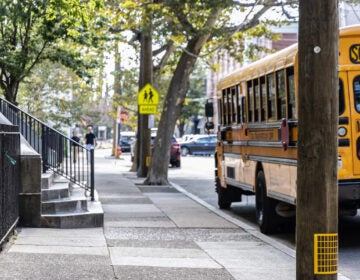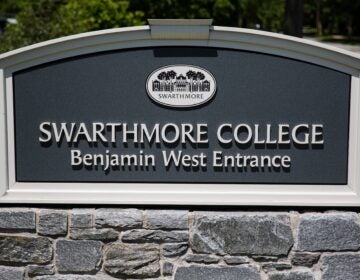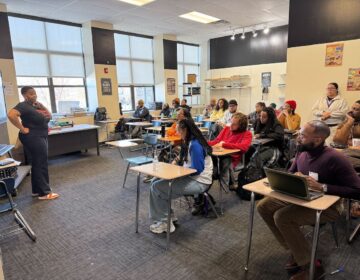As protesters urge the SRC to disband, vote on ASPIRA charters postponed again
Details revealed on Philadelphia Federation of Teachers contract offers and counter-offers. Departing chair Marjorie Neff says that the PFT’s proposals “continue to operate in a financial reality that does not exist.”
As protesters clamored for its dissolution, the School Reform Commission failed to vote once again on a resolution not to renew the charters of Olney High School and John B. Stetson Middle School, both run by the community organization ASPIRA. A motion made by Commissioner Feather Houstoun on the resolution failed to get a second.
The inaction came at the last meeting for two of the five commissioners, Marjorie Neff and Houstoun. Both have announced their intention to resign. Houstoun’s last official day is Friday, while Neff is leaving on Nov. 3.
The five-member board has been in a stalemate on the renewals since the spring, when the charter office first recommended against renewing ASPIRA’s authorization, citing operational and financial irregularities. The deadlock has frustrated both supporters and opponents of the charters by keeping them in limbo.
At her last official meeting, Neff made a lengthy statement that criticized the SRC’s inaction — the third time it took no vote on Olney and Stetson — saying it “failed in our responsibility” and compromised “consistency and transparency” in the charter authorizing process.
Neff also said she was pained that during her tenure the SRC has been unable to reach an agreement with the Philadelphia Federation of Teachers, which has been working under an expired contract for three years. But, she said, “This contract cannot come at the expense of our financial stability.”
With the contract frozen, teachers have received no raises for four years. That means they have not received any increases for accumulating years of experience and additional graduate degrees. One teacher wrote to the Notebook that he should be earning $67,000 a year, reflecting eight years experience and a master’s degree, but is getting paid $55,000 for four years and a bachelor’s.
“I would like nothing more than to resume the contract structure and expectations of the past but I know this cannot work given our current financial realities,” Neff said. “Anyone who says it does is being irresponsible. To the [Philadelphia Federation of Teachers], I ask that you recognize that our success and future depends on having a financially stable district.”
Generally a union supporter, Neff’s statement is a blow to the PFT. She said that the District has made an offer comparable to what has been made to other District unions, all of which have made some concessions over the past four years. She said those offers “have and will provide wage increase and competitive benefits, while allowing the District to remain financially responsible.”
But, she added, “on the other hand, the PFT’s proposals continue to operate in a financial reality that does not exist and would dismantle the financial progress that has been so painful to gain. It is time to settle a contract that is fair, sensible and sustainable.”
Commissioner Bill Green, who is an outspoken critic of the union, took the opportunity to give details on what the District had offered the PFT — drawing gasps from the audience, which is not used to getting these details in advance of a contract agreement.
He said that in June the teachers were offered “a 3 percent lump sum raise with a 1 percent step over the next three years. It had a cost of under $100 million. It was reasonable health care package, not everything they have today and I think fair, what the District can afford.”
The District has been projecting a shortfall of $500 million five years out, assuming current revenue conditions. He said the District’s package would increase that shortfall projection to $600 million, unless the city or state or both gave it additional funds.
Green said that the PFT countered with a “$593 million expense over the next five years. So the deficit would go from $500 million to $1.1 billion” Green said that it is unlikely the state and city would come up with that amount of additional money to help the District meet that obligation.
In an interview later, Neff confirmed Green’s numbers.
“It would cost us over $500 million to restore everybody to where they were,” she said. “We can’t afford it.”
PFT president Jerry Jordan called the SRC proposal to the union that was outlined by Green a “joke, or worse yet, an insult.”
He declined to describe the PFT’s negotiating position, arguing such conversations should be reserved for the bargaining table. But he did say the District hasn’t put forth a proposal that acknowledges the sacrifices union members have made in the years they’ve gone without a raise.
Nor, said Jordan, has the district made offers that “are grounded in reality or are respectful of the work our members do.” He said the district’s offer would barely keep pace with cost-of-living adjustments.
The stalemate over ASPIRA reflects a split between Neff and Houstoun, who agree with the charter office’s recommendation not to renew contracts for Olney and Stetson, and Green and Sylvia Simms, who do not — at least not yet. Farah Jimenez abstained during a May vote to table further action on the ASPIRA schools. Three votes are necessary for any action.
“From my perspective, I think academically the school is performing better than most District neighborhood schools,” Green said in an interview. “And, as a consequence, if they can solve their governance and finance issues to my satisfaction then I would consider renewing the charter with specific conditions and a surrender clause.”
Plus, Green added, “The District has no plan to take over the schools. I’d like to see there be a District plan for the school as we’re being asked to non-renew.”
In its recommendation, the charter office said that the organization had no documentation or recorded board votes for many transactions. For instance, Olney High School was listed as owing ASPIRA more $2.5 million without any indication there had ever been a loan or board resolutions on what the money was used for.
Ken Trujillo, who has been retained by ASPIRA as “oversight counsel” to work with the SRC on the charter renewal process, attended the meeting, and several students from Stetson spoke in favor of renewal.
“I don’t know what the SRC is doing…I don’t know what the delay is,” Trujillo said.
Trujillo, a politically connected attorney, said that the financial and operational issues that the charter school office raised in recommending non-renewal of the charter “have been addressed.”
Dawn Lynne Kacer, director of the charter school office, said later: “I do not have documentation that all of the issues raised in their renewal report have been satisfied.” Neff, in an interview, said that there is a difference between “promises to address” and proof that the issues have been addressed.
In her remarks at the meeting, Neff said that failing to take any action undermines confidence in the District’s “strong authorizing framework,” robbing it of “two critical needs, consistency and transparency.’
She urged a vote as soon as possible, “regardless of the outcome.”
A contingent of parents from Kenderton Elementary School bore witness at the meeting to what can happen when the District takes over a charter and is not completely prepared to do so.
Shereda Cromwell broke into tears while describing the conditions at Kenderton for the first few weeks of school. Scholar Academies had managed Kenderton until June, when it surrendered the school back to the District, blaming fiscal constraints.
Now, under District control, Kenderton is understaffed and many of the students are unsupervised, said Cromwell. Parents and teachers don’t feel safe. “We need answers,” said Cromwell. “Our school needs help. These kids need help. Parents are losing sleep everyday about what’s happening at our school. Everyone, when they see us, they say, ‘We know what is happening at Kenderton,’ but no one is doing anything.”
Superintendent William Hite told the parents that he had visited the school and was aware of the issues there, and said they were being addressed After the meeting adjourned the District issued a statement.
“The school district is working diligently to support the students and community at Kenderton,” said Lee Whack, deputy chief of communications.
As the SRC met inside, dozens rallying outside called for the commission to abolished altogether.
Our City Our Schools — a recently formed group that has the backing of the Philadelphia NAACP and the Caucus of Working Educators, among others — held a rally Thursday to advocate dissolving the SRC and replacing it with a local school board.
The idea isn’t novel, but it’s picked up momentum with the recent announcement that Houstoun and Neff will leave the SRC. A third commissioner, Sylvia Simms, will leave the five-member body in January.
That scenario creates a rare opening for advocates who want to bring an end to the SRC’s 15 years in charge of the District. The three new members could vote to dissolve the body and set up a return to local control.
One of the three new members will be appointed by Gov. Tom Wolf, who has long said he favors abolishing the SRC. Wolf’s nominee, however, will have to pass muster with the GOP-controlled state senate.
Philadelphia Mayor Jim Kenney will select the other two new commissioners. Protesters had a message Thursday for him.
“Do what the hell you said you were gonna do,” said parent and activist Tonya Bah to cheers from the crowd. “Now I’m OK with a one-term mayor. How about you?”
It’s a bit unclear, however, what Kenney has vowed to do.
During his mayoral campaign he said he favored getting rid of the SRC, but not until the District is on firm financial footing. He worried Harrisburg would starve the district of state aid if the city moved abruptly to retake control of the schools.
In a statement Thursday, Kenney reiterated he did “want local control for the School District,” but said the timing wasn’t right. The mayor said the city should wait at least a year so local leaders can determine the best governance structure to replace the SRC.
“In order to regain local control in time for next school year, this dissolution declaration must be issued by mid-December,” said Kenney. “It is highly unlikely that the votes to recommend dissolution will be in place in time. But even if we had the votes this year, I do not think that pursuing that option is in the best interest of our students, teachers and families at this time.”
The SRC was originally installed as part of a trade off with Harrisburg Republicans. The tacit understanding was that by allowing some state control of city schools, the district would receive needed funding and wouldn’t suffer from neglect. Critics say that hasn’t been the case, and point to a number of recent financial shortfalls as proof.
Before the 2001 state takeover, Philadelphia schools were run by a locally appointed school board. On Thursday, four city council members penned an op-ed on Philly.com calling for the SRC to be dismantled in favor of an appointed board. The quartet — consisting of council president Darrell Clarke, Helen Gym, Jannie Blackwell, and Blondell Reynolds Brown — called state oversight a “failed experiment.”
“After 15 years of state control, some Philadelphians have gotten used to managing expectations for what public schools can deliver,” they wrote. “Unpredictable annual state funding and political turbulence in Harrisburg have created a state of crisis fatigue, where conditions that would be viewed as outrageous elsewhere are numbly accepted here – including, unfortunately, by some people in positions of political power.”
In their proposal, the council members said the members of this new local school board should be appointed by the mayor, but approved by city council. Others have advocated for installing an elected school board, as exists in many suburban districts.
Ron Whitehorne, a leader of the movement to abolish the SRC, said that the alleged purpose of the takeover — to put the District back on solid financial and academic footing — has not been achieved. Since it assumed controlled, the state has not poured extra money into Philadelphia nor made any special efforts to access its needs.
“The first couple of years, there were some resources, but all they did is give us the power to tax ourselves. They said, ‘You can go after the smokers.’”
The city needed permission from the state to raise money for schools, and the state also gave it the okay to add a penny to the sales tax for education.
Ideally, Whitehorne said, Philadelphia should have an elected school board that can raise its own taxes, which it has never had in its history. The old nine-member Board of Education, appointed by the mayor, had no taxing power and still had to beg for funds from City Council and the state.
Such a leap would require a change to the city charter, at the least.
The PFT is also ringing the bell for change. On Thursday president Jerry Jordan put out a statement of his own calling for the SRC to be dissolved.
“What is abundantly clear is that it is time to replace the SRC,” he said.
The union supported Kenney during his mayoral bid and could add pressure to the mayor as he navigates this politically tricky issue.
WHYY is your source for fact-based, in-depth journalism and information. As a nonprofit organization, we rely on financial support from readers like you. Please give today.













